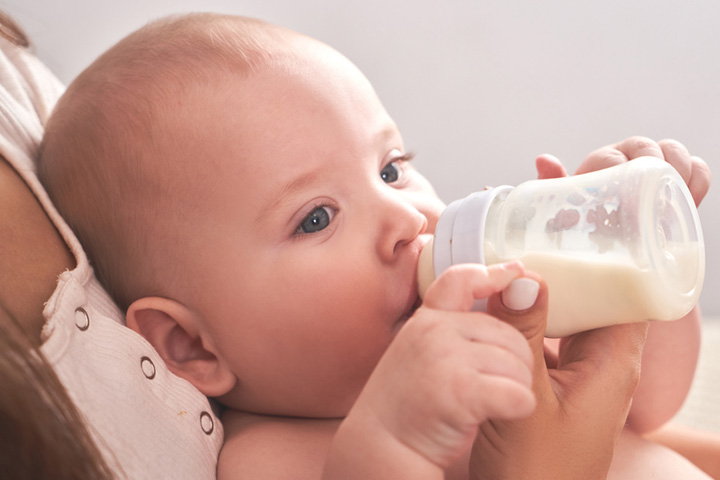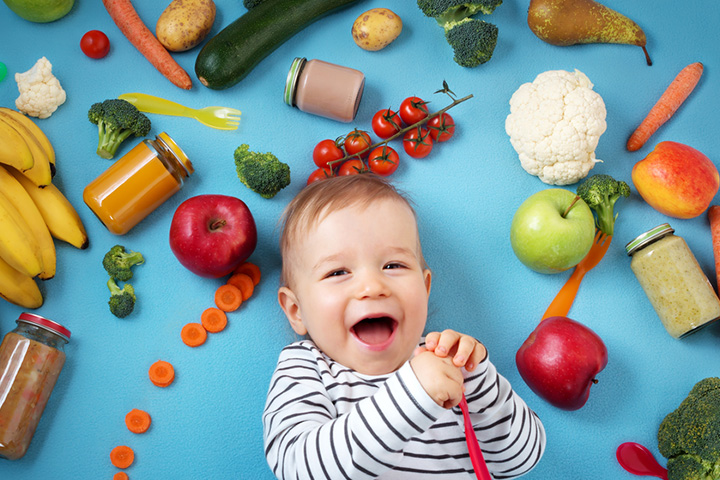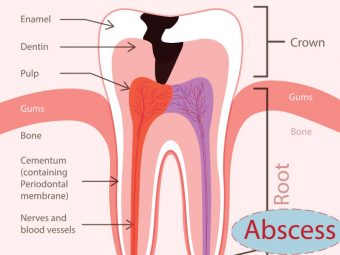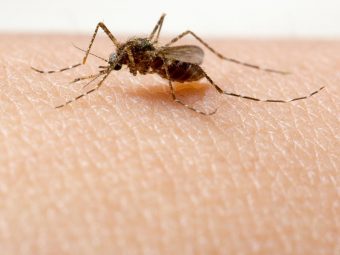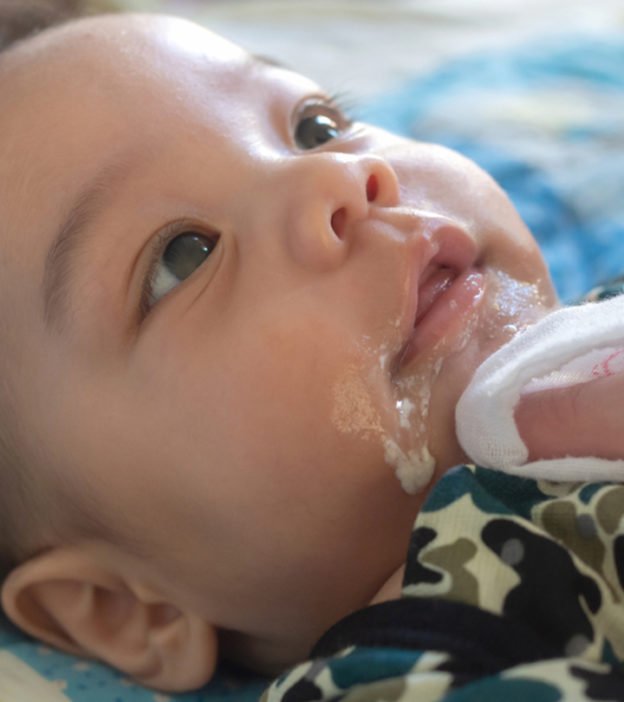
Image: Shutterstock
As a new parent, you may worry if your baby spits up curdled milk. However, milk gets curdled when mixed with stomach acid, which is normal during digestion. Occasionally, babies may spit up curdled or undigested milk as they have an immature digestive system.
Excessive spitting up of curdled milk or any stomach contents is a cause of concern.You may consult a pediatrician in such cases since it could be due to underlying causes that may require medical or surgical care.
Keep reading this post to explore the possible causes and tips to manage the spitting up of curdled milk in babies.
Possible Causes Of Spitting Up Curdled Milk
Babies may spit up curdled milk occasionally without apparent causes. However, excessive spitting up of curdled milk can be due to any of the following reasons(1).
1. Acid reflux
Acid reflux can be a common cause of spitting up curdled milk in newborns and young babies.ImmaturegastroesophagealsphincteriXA ring-like muscle responsible for closing or contracting bodily passages and openings.may cause stomach contents to come up through the esophagus and reach the mouth.
Feeding in an upright position, feeding less and more often, and keeping the baby in an upright position for 20 minutes after feeding may help reduce the instances of spitting up refluxed curdled milk in some babies.
Some babies with severe acid reflux may require food thickeners for breast milk or formula. You may seek a pediatrician’s advice to choose the best method to manage acid reflux in your baby. Some may require medications to prevent acid reflux.
2. Food intolerance or allergy
Image: Shutterstock
Lactose intolerance or milk allergy could cause frequent regurgitation of curdled milk in some babies.A dietician may assist you with allergy investigations and whether you need to cut out certain food groups during breastfeeding.
If formula feeding, switching to specific formulas, such as low-lactose formula or hypoallergenic formula (hydrolysateiXBy-products of hydrolysis, a process where a chemical reacts with water to form one or two more substancesformula), may improve the baby’s condition.
Some babies may spit up curdled milk if they are drinking cow’s milk. Eliminating cow’s milk from the diet could resolve this problem. You must only introduce cow’s milk once the baby is older than 12 months.
 Quick fact
Quick fact3. Pyloric stenosis
PylorusiXA valve that connects the stomach to the duodenumis the outlet of the stomach. Pyloric stenosis is a condition where the pylorus is narrowed and obstructed.The condition interferes with the movement of food from the stomach to the intestines.It can cause the baby to regurgitate curdled milk from the stomach.
Babies may have projectile vomiting of curdled milk, no bowel movement or constipation, and weight loss due to pyloric stenosis. You may seek medical care for diagnosis and treatment.
4. Overfeeding
Image: Shutterstock
Babies fed more than the required amount tend to spit up curdled or regular milk since their stomach is full. The gastroesophageal sphincters may open due to pressure and cause the backflow of stomach contents inoverfed babies.
5. Immature gastrointestinal system
Immature or underdeveloped gastrointestinal structures and functions can be a reason for frequent spit-up in many babies.Newborn babies and premature babies are more likely to have an immature GI system.
6. Feeding position
Babies fed in lying down positions may quickly spit up when compared to babies who are mostly fed in an upright position. Milk tends to move down promptly in an upright position, and the position may also help keep the esophageal sphincters closed.
Breastfed babies may benefit from being fed in a laid-back breastfeeding position which can help pace the milk flow.
7. Swallowing air
Some newborns vomit as a result of swallowing air because of a fast milk flow or suboptimal latch to the breast or bottle teat while feeding. The gastroesophageal sphincters may open for burping, and babies may spit up milk or curdled milk along with burp.
Try to identify and avoid the possible causes of spitting up curdled or regurgitated milk. Seek medical care if the baby continues to spit up curdled milk despite interventions.
 Quick tip
Quick tipWhat Does Normal Baby Spit-up Look Like?
Image: Shutterstock
Spit-up can be whitish in breastfed and formula-fed infants. Older infants who are eating solid foods may have spit-up of other colors, depending on what they eat. Sometimes, babies may spit up saliva or stomach acid that may look like a clear fluid.
A red color and coffee-ground color may indicate bleeding in the stomach or upper gastrointestinal (GI) tract, and yellow or green color can be due to bile or phlegm. You may seek medical care if spit-up has these colors.
When To Call A Doctor?
You may contact the healthcare provider if your baby spits up excess curdled milk or spits up frequently. You may seek medical care for both curdled spit-up and normal spit-up.
Seek medical care if your baby has any of the following conditions with excess spit-up(4).
- Noweight gain
- Forceful spit-upor vomiting
- Green or yellow fluid
- Blood in spit-up or coffee-ground appearance of the spit-up
- Refuses to eat or drink
- Blood in stool
- Breathing problems after spit-up
- Dehydration
- Continuous or frequent crying
Image: Shutterstock
Stopping or reducing breastfeeding or changing to formula feeding without consulting a pediatrician is not an ideal decision. Spitting up curdled milk can be due to various reasons. The doctor will diagnose the underlying cause and commence the necessary treatment for relief.
Tips To Reduce Spitting Up Curdled Milk
The following tips may help to reduce spitting up curdled milk in babies(2)(3).
- Feeding in an upright position or laid back breastfeeding position may help tominimize spit-up.
- Do not overfeed since babies tend to spit up more when the stomach is full.
- Do not let the baby lay on their stomach immediately after feeding.
- Manage milk flow or adjust feeding positions if you have an oversupply of milk.
- Avoid dressing the baby in tight clothes that may put pressure on their belly while feeding.
Image: IStock
- Feed in regular intervals; long gaps between feedings may increase stomach acid build-up.
- Give medications on time if prescribed.
- Modify the diet of infants who are on solid food as per recommendations.
- Breastfeeding mothers may modify their diet as per recommendations.
- Discuss the necessary surgery with your doctor if spitting up is due to certain conditions, such as pyloric stenosis.
Spitting up of curdled milk can be avoided in many babies. However, if your baby tends to spit up more than usual, you may seek medical care.
常见问题
1. What is the difference between curdled spitting-up and vomiting?
Curdled spitting is when a baby spits a small amount of food. The content gently dribbles from the mouth and may follow a burp. Since the milk had time to mix with the stomach’s acid, it might appear curdled. On the other hand, vomiting looks more forced with discomfort on a baby’s face. While spitting up is normal, vomiting can be due to an illness (5).
2. When do babies stop spitting up milk?
Babies spit up due to their underdeveloped digestive systems. Spitting-up might stop once the baby’s digestive system matures, at the age of one year, around the same time they start to consume solid foods (6).
There could be no serious medical reason for a baby spitting up curdled milk in small amounts. However, if your baby repeatedly spits up excessive amounts of curdled milk, it could be due to underlying conditions such as pyloric stenosis, allergies, reflux, etc. Most babies outgrow this habit as they grow older and have a well-developed digestive system. Nevertheless, if this practice continues in your baby, it is important to identify the cause and resolve them. Contact a pediatrician for proper diagnosis and treatment of the underlying issue.
Infographic: What To Do When A Baby Spits Up?
Babies can spit up with or without underlying conditions. Carefully observing the frequency, timing, and quantity of spitting up and associated symptoms helps you find the causes. You may seek medical attention if it is frequent and severe. Go through the infographic to know possible causes of spitting up and what to do for your baby.
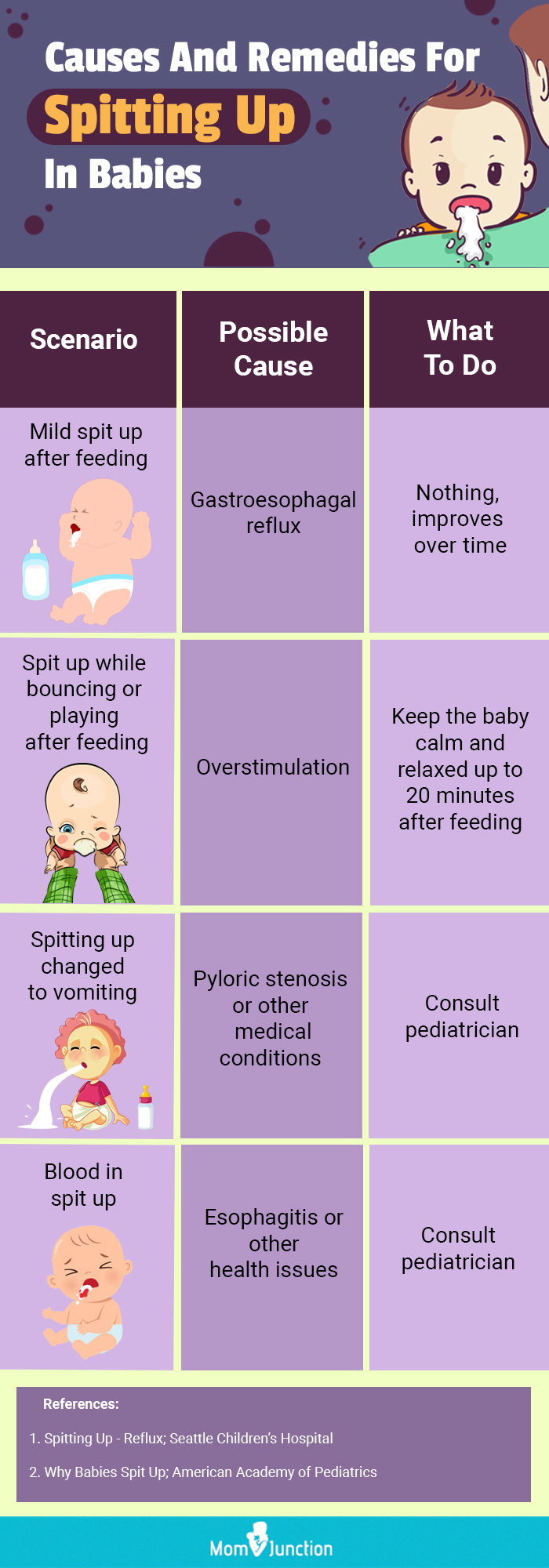
Illustration: Momjunction Design Team
Get high-quality PDF version by clicking below.
Download Infographic
Key Pointers
- Babies may occasionally spit up curdled milk for no apparent reason.
- Contact your child’s doctor if your baby spits up in excess.
- Breastfeeding in an upright or a relaxed position may assist in reducing spit-up in babies.
References:
2.Spitting up in babies: What’s normal, what’s not; St. Clair Hospital
3.Why is my baby spitting up so much breast milk?;Texas Children’s Hospital
4.Spit-Up Concerns; Boys Town National Research Hospital
5.Why Babies Spit Up; HealthyChildren.org
6.Gastroesophageal Reflux in Infants and Children; American Family Physician



 专家说
专家说